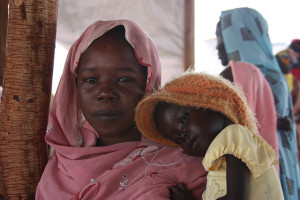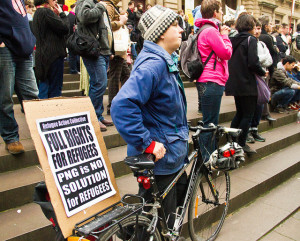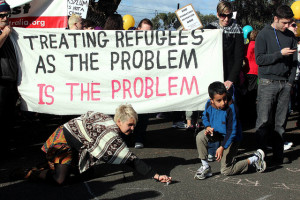Migration is now the hot issue among American voters and in the European Union. And it’s a very sensitive one too.
 On the one hand, people are desperate to escape awful conditions in their own country and provide a much better life for their sons and daughters. To them, the long process of legal immigration is not a viable option. And for Middle Eastern war refugees, starting over elsewhere is a life or death matter.
On the one hand, people are desperate to escape awful conditions in their own country and provide a much better life for their sons and daughters. To them, the long process of legal immigration is not a viable option. And for Middle Eastern war refugees, starting over elsewhere is a life or death matter.
According to a BBC news account published on May 28, 2015,
“From the Mediterranean to the Andaman, it’s been a season of despair, the faces of migrants haunting television screens and dominating headlines.”
However, those born in in the host country and legal immigrants often tend to be emotionally torn.
Economics
 Many do empathize. Some few even remember the tragedy of Jews desperately trying to escape Nazism but unable to find a place willing to take them in. Yet, most today are also worried about their county’s ability to cope with the sheer number of people daily crossing their border with no means to pay for anything.
Many do empathize. Some few even remember the tragedy of Jews desperately trying to escape Nazism but unable to find a place willing to take them in. Yet, most today are also worried about their county’s ability to cope with the sheer number of people daily crossing their border with no means to pay for anything.
A July 28, 2015 DW news article referred to the gloomy viewpoint of an official in Germany.
“Federal Interior Minister Thomas de Maizière recently spoke of the looming “collapse of the asylum system”
It’s especially tough financially for some countries. Essentially bankrupt Greece is a natural entry point for Syrian and Iraqi refugees from the Middle East, and financially wobbly Italy seems to be a favorite port of call for African migrants.
Second Worry
Increasingly, monetary concerns are coupled with a deep-seated fear that a large influx of migrants will dramatically change the established religious values and culture of one’s nation.
Countries, and people in them, are reacting.
In the United States, presidential candidate, Donald Trump, is capitalizing on voter worries. One of his proposals is to construct a barrier all along U.S.A.’s southern border. In Europe, Greece and Bulgaria have built walls some places to keep out refugees, and Hungary apparently is on the way to completing one.
Priorities
Some Europeans are beginning to call for Christians seeking asylum to be given top priority or, like in Slovakia, exclusively be granted it.
On the surface, this makes sense to Westerners.
Islamists, ostensibly, would still be welcomed by fellow Islamists in the rest of the Middle East, in large parts of Asia, and some portions of Eastern Europe while Christians aren’t really.
But where do such exclusivity policies leave religious minorities like Yazidis or Jews? And in the future, will Christians who continue to observe markedly different customs from the mainstream be warmly accepted? Don’t count on it.
Hot Button Issue
Migration, regardless of its root cause, is viewed as a threat to the socio-economic landscape of the Western world. In Europe, people eager for solutions appear to be running out of patience . Yet, to date, not one world leader has been able to propose and implement something on migration that works for host countries and for those needing asylum. But try they will.
However, clearly, no one would be talking about the issues of massive migration and refugee relocation if global stability, genuine cooperation, and real peace actually existed. The good news is such conditions can occur under the right governance. And that’s already planned.
Photo Credit: Sudanese Refugees by EU/ECHO/Malini Morzaria; Not the Problem by Takver; Pro Refugee by Tali C; Licenses: CC BY-NC-SA 2.0
Read the BBC article here
Read the DW July article here
Read a Washington Post Slovakia article here
